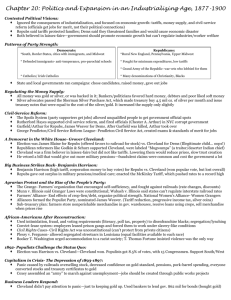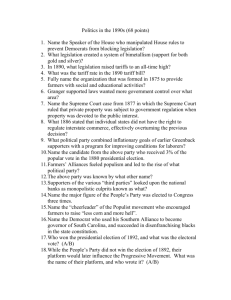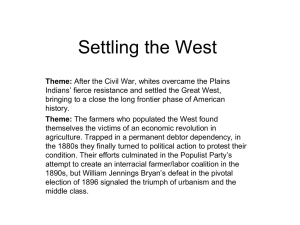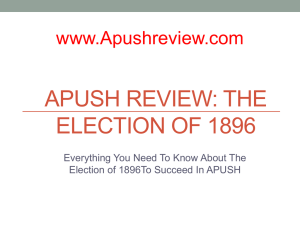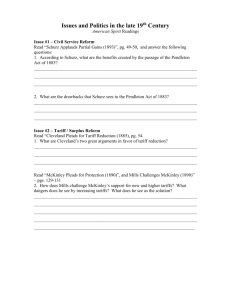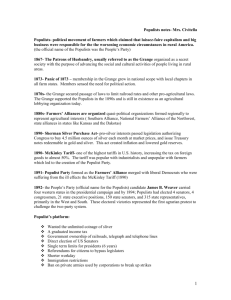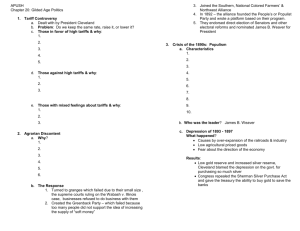Document
advertisement
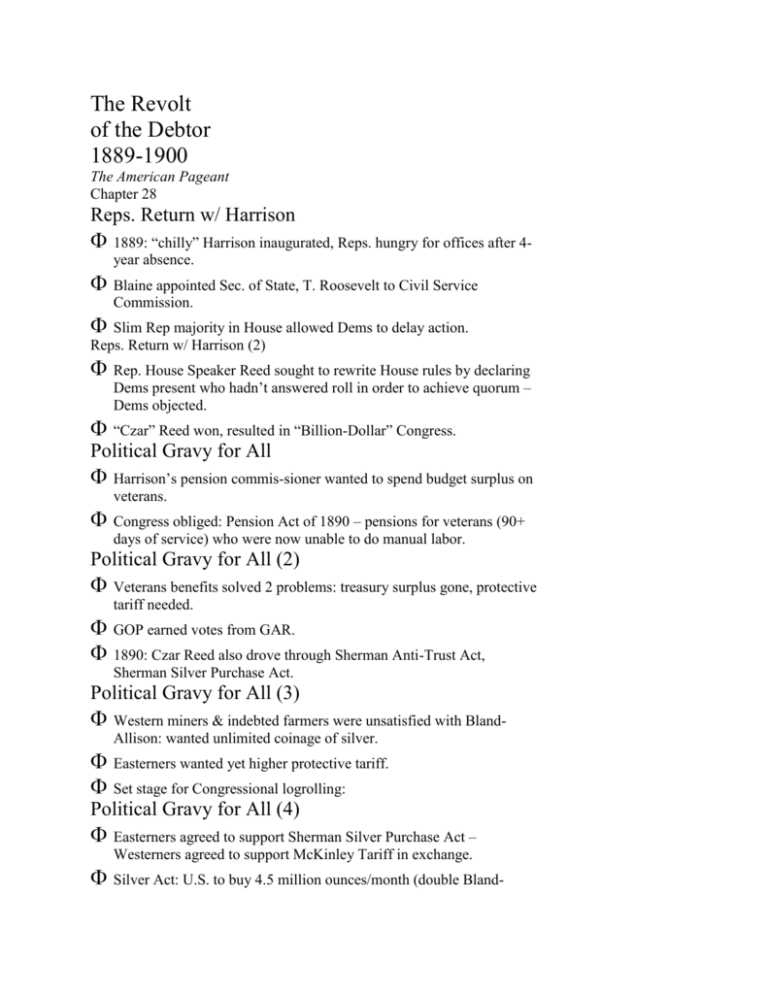
The Revolt of the Debtor 1889-1900 The American Pageant Chapter 28 Reps. Return w/ Harrison 1889: “chilly” Harrison inaugurated, Reps. hungry for offices after 4year absence. Blaine appointed Sec. of State, T. Roosevelt to Civil Service Commission. Slim Rep majority in House allowed Dems to delay action. Reps. Return w/ Harrison (2) Rep. House Speaker Reed sought to rewrite House rules by declaring Dems present who hadn’t answered roll in order to achieve quorum – Dems objected. “Czar” Reed won, resulted in “Billion-Dollar” Congress. Political Gravy for All Harrison’s pension commis-sioner wanted to spend budget surplus on veterans. Congress obliged: Pension Act of 1890 – pensions for veterans (90+ days of service) who were now unable to do manual labor. Political Gravy for All (2) Veterans benefits solved 2 problems: treasury surplus gone, protective tariff needed. GOP earned votes from GAR. 1890: Czar Reed also drove through Sherman Anti-Trust Act, Sherman Silver Purchase Act. Political Gravy for All (3) Western miners & indebted farmers were unsatisfied with BlandAllison: wanted unlimited coinage of silver. Easterners wanted yet higher protective tariff. Set stage for Congressional logrolling: Political Gravy for All (4) Easterners agreed to support Sherman Silver Purchase Act – Westerners agreed to support McKinley Tariff in exchange. Silver Act: U.S. to buy 4.5 million ounces/month (double Bland- Allison) with notes redeemable in gold/silver. Political Gravy for All (5) McKinley: highest peacetime tariff rate yet - 48.4% avg., plus sugar subsidy, farm tariff. 1890: Western discontent over tariff resulted in landslide defeat for Reps: Dems won 235-88 House majority, plus 9 reps. from Farmers’ Alliance. 1892 Populist Challenge 1892 election: Rep tariff gave Dems high hopes, nominated former pres. Cleveland. Reps renominated Harrison, championed tariff. People’s party (Populists), rooted in Farm. Alliance, grew from farmers in South/West. 1892 Populist Challenge (2) 1. 2. 3. 4. 5. Populists platform demanded: Free/unlimited silver at 16:1 Graduated income tax Gov’t ownership of telephone, telegraph, RR. Direct election of US Senators. 1-term limit on presidency. 1892 Populist Challenge (3) 6. 7. Use of initiative & referen-dum to propose/review laws. To get labor support, demanded shorter workday, immigration restrictions. Nominated former Greenback Labor party nominee Gen. James Weaver. 1892 Populist Challenge (4) Summer, 1892: strike epidemic raised Populists’ hopes of joining with labor. Federal troops called in to break strikes at Carnegie’s Homestead steel plant (following Pinkerton detectives battle) & ID silver mines. 1892 Populist Challenge (5) 1892: Populists received over 1 million popular votes, 22 EC votes for Weaver, but largely failed to attract labor. Supported by western states, esp. KA, CO, ID, NV. Failed in South b/c of white reaction to courting blacks. 1892 Populist Challenge (6) Reminder of potential black political power resulted in near complete loss of Southern black suffrage through literacy tests, poll taxes, “grandfather clause.” 1892 Populist Challenge (7) Accompanying Jim Crow laws also enforced racial segrega-tion in public places. Populist party, Watson abandoned interracial appeals, lapsed into racism – after 1896 advocated black disfranchise-ment. “Old Grover” Again 1893: Cleveland takes office – only president ever reelected after defeat. Depression of 1893, 1st large-scale depression of industrial age, hit urban masses hard. “Old Grover” Again (2) Causes: overbuilding, over-speculation, labor disorders, pre-existing agricultural depression, damaged U.S. credit from free-silver push. 8,000 businesses & dozens of RRs failed. “Old Grover” Again (3) Soup kitchens, charities attempted to care for unemployed, hoboes. Gov’t did nothing: laissez-faire philosophy dominated. Cleveland’s problem: under Sherman Silver act, gold was being drained from treasury. “Old Grover” Again (4) Federal gold reserve dipped below $100M, Cleveland called special Congressional session to repeal Silver Purchase Act (summer, 1893). W. J. Bryan led opposition in House, but Cleveland pre-vailed, divided Dem party. Gold/Job Shortages Repeal of Silver Act only slowed gold drainage: by Feb. 1894, U.S. reserve down to only $41M. Danger: going off gold stand-ard would make currency unreliable, cripple internation-al trade. Gold/Job Shortages (2) To save sound money, Cleve-land issued bonds to get gold, but “endless-chain” continued to drain gold from reserve. Cleveland borrowed $65M in gold from J.P. Morgan, other bankers, to restore confidence. Gold/Job Shortages (3) Unemployed demonstrated for help, e.g. Coxey march. Jacob Coxey, wealthy quarry owner, led “Commonweal Army” to D.C. to demand unemployment relief through public works paid for by $500M in inflationary notes. Pullman Strike Crushed 1894: Pullman strike most sev-ere of violent labor protests. Pullman co. cut wages by 1/3, but did not lower rent on workers’ homes. Eugene Debs’ American Railway Union led paralyzing strike against Pullman. Pullman Strike Crushed (2) IL Attorney Gen. Olney argued for federal troops needed to guarantee mail: Cleveland agreed, U.S. troops crushed strike. 1st use of court injunction to end strike: Debs sent to prison 6 mos. for defying court. Pullman Strike Crushed (3) Concern of labor: “gov’t by injunction” could imprison labor leaders w/o jury trial. Labor saw in Pullman strike alliance between big business and federal courts. Dem Tariff Tinkering McKinley Tariff resulted in $61M budget deficit by 1894. Dems passed Wilson-Gorman Bill: reduced tariff slightly, added popular 2% tax on incomes over $4,000, but full of lobbyist-sponsored pork for various industries. Dem Tariff Tinkering (2) Cleveland disapproved, but wanted lower tariff, so allowed bill to become law w/o his sig. 1895: Sup. Ct. struck down income tax – more evidence for Populists that courts were tools of wealthy. Dem Tariff Tinkering (3) 1894: Dems paid price for tariff/depression – Reps won House in landslide, 244-105. Populists, debtors increasingly believed in free silver as cure-all, e.g. pamphlet Coin’s Financial School. McKinley: Hanna’s Boy 1896 campaign: Ohio resident, war veteran, former congressman McKinley was best Rep. candidate. McKinley nomination engineered & financed by wealthy presidentmaker, Marcus A. Hanna. McKinley: Hanna’s Boy (2) Hanna: Hamiltonian, believed prosperity would “trickle down” to laborers. Platform: came out for gold standard and international bimetallism, an empty gesture toward free silver supporters. Bryan: Silverite Messiah Conservative, unpopular Cleveland rejected by Dems. William Jennings Bryan (NE) delivered “Cross of Gold” speech at convention, received Dem nomination next day. Platform: unlimited coinage of silver at 16:1. Bryan: Silverite Messiah (2) Conservative “Gold Bugs” (incl. Cleveland) bolted Dem party, nominated their own ticket or supported McKinley. Democrats stole Populist plank, so most Populists endorsed Bryan, Dems. Hanna Leads “Gold Bugs” Bryan forced free silver to center of campaign by stumping through 27 states. Silverites saw Bryan as mes-siah to save them from debt. Hanna used fear of Eastern conservatives to amass huge campaign war chest. The Pocketbook Vote Hanna used $ to flood voters with pamphlets, speakers. Complexity of bimetallism meant loudest voice won. Reps also reminded voters of “Democratic panic” – campaigned for “McKinley and the Full Dinner Pail.” The Pocketbook Vote (2) Just before election, increased wheat prices dampened concerns of farmers. But fear of Bryan motivated factory owners & business-people to tie future orders or wages to McKinley victory. Class Conflict Fear, hope brought record numbers to polls: McKinley won decisively, but regionally. Labor went with McKinley to keep jobs, no desire for inflation. Bryan’s defeat: end of winning w/ mostly agrarian votes. Class Conflict (2) Future of politics lay in cities. 1896 victory was 1st of string of Rep victories (16 years). Rep dominance also brought diminished voter turnout, end of money/civil service debate. New era called “fourth party system.” Republican Standpattism Cautious McKinley gave busi-ness free reign, trusts grew. Mainly went along with party, good relations with Congress. Problems: Wilson-Gorman tariff not providing enough revenue, Rep. campaign con-tributers wanted higher tariff. Republican Standpattism (2) 1897: “Czar” Reed oversaw passage of Dingley Tariff, raised rates to 46.5% avg. Lobbyists got over 850 amendments added in Senate. Higher than Dem. Wilson-Gorman tariff, in some cases higher than McKinley. Inflation Without Silver 1897: prosperity returned, farm prices rose, Reps took credit. 1900: Gold Standard Act passed: paper currency to be redeemed freely in gold. Prosperity dampened opposition of silverites. Inflation Without Silver (2) In retrospect, gradual inflation was needed, but free silver generated too much fear. Gold discoveries in Canada, AK, S. Africa, Australia & cyanide extraction process increased money supply, provided needed inflation.
